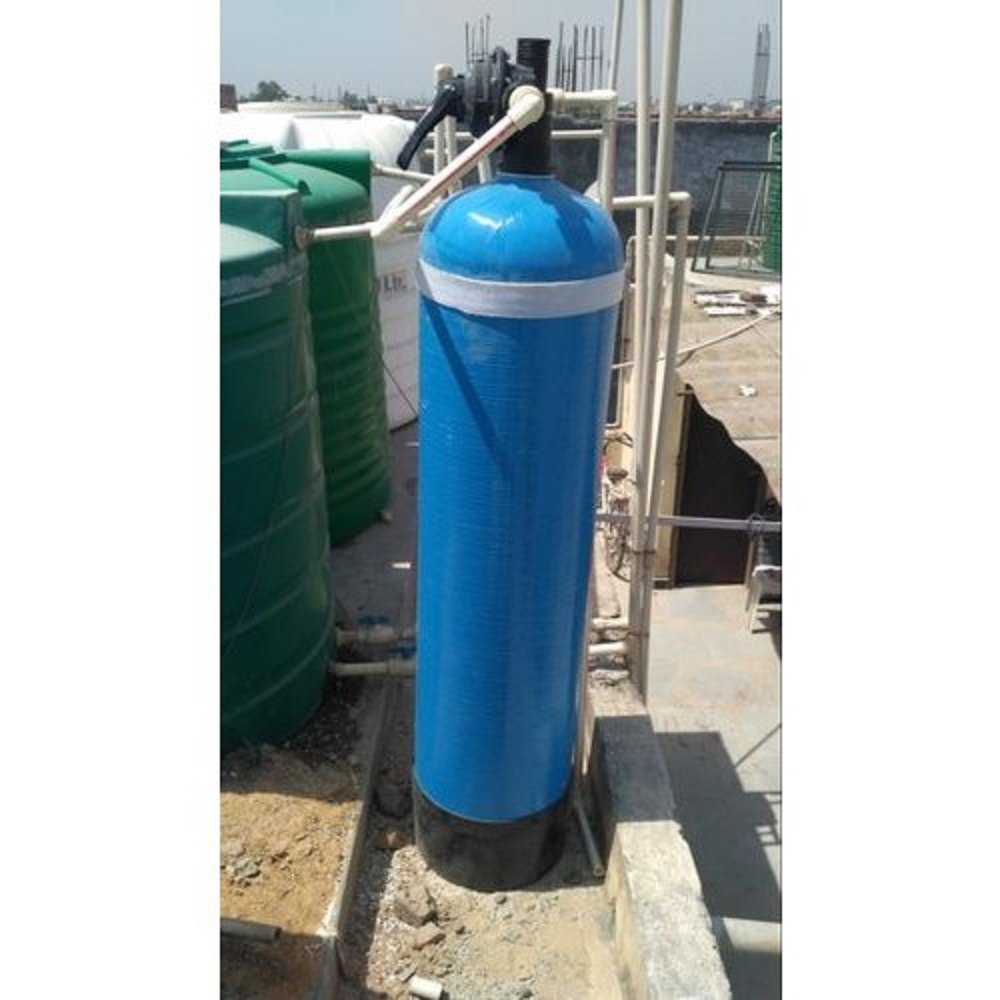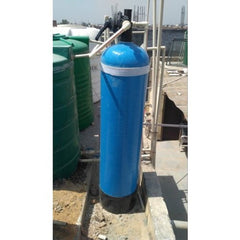Call Us Now : (+91) 8725000041


water softener for hard water 1354/100 Manual
- Rs. 60,000.00
Rs. 75,000.00- Rs. 60,000.00
- (-20%)
- Unit price
- per
GST Tax calculated on checkout
Let customers speak for us
Couldn't load pickup availability
Water Softener Specifications
The specifications of a water softener can vary depending on the model, size, and type of system. Below is a general overview of the typical specifications you can expect to find for a residential or commercial water softener.
1. Water Softener Capacity
-
Flow Rate:
- This is the amount of softened water the system can deliver (LPH)per hour
- ltr Typically between 1000-2000 Liter per hour , depending on household size.
2. Resin Type and Quantity
-
Resin:
- The resin in a water softener is the medium that removes calcium and magnesium ions from water.
- Cation resin is commonly used for residential systems.
-
Resin capacity is measured in Ltr. Typical residential systems use around 100 Ltr of resin.
3. Regeneration Type
-
Time-Based Regeneration:
- The system regenerates after 3 - 15 days depend on usage .
-
Metered Regeneration:
- Regeneration is based on the amount of water used, ensuring that the system regenerates only when necessary.
-
Manual Regeneration:
- Users must trigger regeneration manually when required.
4. Salt Capacity
-
Salt Storage Capacity:
- Salt is used to regenerate the resin in the softener.
- Residential models: Typically hold between 15 to 30 KG of salt, depending on the size of the system.
5. Dimensions and Installation Requirements
-
Dimensions:
- Residential models typically range from to 65 inches in height and 14 inches in width.
- Residential models typically range from to 65 inches in height and 14 inches in width.
-
Water Connection:
- The unit must be connected to the main water line, with standard plumbing requirements (typically 3/4” to 1” pipe).
- Ensure that the installation location has adequate space, proper drainage, and access to a power source if necessary.
6. Voltage and Power
-
Power Supply:
- Most water softeners operate on standard or 220V electrical outlets.
- Most water softeners operate on standard or 220V electrical outlets.
7. Bypass Valve
-
Bypass Valve:
- This is a feature that allows you to bypass the softener and use untreated water when needed (e.g., for gardening or emergencies).
- Most residential systems include a bypass valve for easy operation.
8. Control Head/Valve
-
Control Valve:
- The control valve is the brain of the water softener, determining when to regenerate and managing water flow..
- Manual: More basic, requiring manual adjustments for regeneration cycles.
11. Additional Features
-
Advanced Resin Technology:
- Some water softeners feature advanced resin beads that offer higher efficiency and faster ion exchange.
-
Bypass Valve with Multiple Settings:
- Some units offer adjustable bypass options for different types of plumbing setups.
Sample Specification Table for Residential Water Softener
| Specification | Value |
|---|---|
| Capacity | 10000 ltr to 15000 ltr |
| Flow Rate | 1000 lph to 1500 Lph |
| Resin Volume | 100 LTR |
| Salt Capacity | 15 to 30 kg |
| Regeneration Type | Time-Based / Metered |
| Dimensions | 54” H x 13” W |
| Voltage | 220V |
| Bypass Valve | Yes |
| Warranty | 1 years |
| Control Valve | Manual |
Water softeners can be customized for specific household or business needs based on water hardness, flow rate, and other requirements. Selecting the right specifications ensures that your system performs efficiently and provides long-lasting benefits.
Before purchasing and installing a water softener, a water analysis is often recommended. The analysis will:
- Determine water hardness: Measuring the calcium and magnesium levels to assess the severity of hardness.
- Identify other contaminants: Such as iron, chlorine, or sulfur that could affect the water's taste and safety.
- Help size the system: Proper water analysis ensures that the softener is correctly sized for the water usage needs of the household or business.
Water analysis may be included in the purchase process or available for an additional fee. we offer free or discounted water tests when purchasing a softener.
Once the water softener is purchased, it will be delivered directly to your address. Delivery services generally include:
- Standard shipping: Free or low-cost shipping options, with delivery times typically ranging from 2 to 7 days.
- Expedited shipping: For faster delivery, We offer expedited shipping for an additional fee.
- Assembly and setup options: In some cases, delivery can include assembly services, though this is typically separate from installation.
Ensure that your delivery address is prepared to accommodate the size and weight of the water softener.
A water softener provides numerous advantages that improve water quality and protect your home and appliances:
- Prevents Limescale Build-Up: Protects plumbing systems, faucets, dishwashers, washing machines, and water heaters from scale buildup, which can cause costly repairs and inefficiencies.
- Improves Skin and Hair Quality: Softened water is gentler on skin and hair, reducing irritation, dryness, and frizz.
- Enhances Soap and Detergent Effectiveness: Soap and detergent work more effectively in soft water, leading to cleaner clothes, dishes, and surfaces.
- Reduces Energy Bills: By eliminating scale buildup in heating elements, water heaters and boilers work more efficiently, saving energy.
- Longer Appliance Lifespan: Water softeners help preserve the lifespan of appliances by preventing mineral buildup that can cause wear and tear.
- Better Taste and Odor: Softened water often tastes better, and certain models include filtration features that further improve the quality of drinking water.
- Environmental Benefits: Using less soap and detergent is eco-friendly, and a water softener reduces the need for harsh chemical cleaners.
With a water softener, you'll experience cleaner, safer, and more enjoyable water throughout your home or business
Installation
Professional installation is often recommended for water softeners to ensure proper setup. The installation process includes:
- Connecting the softener to the main water supply: This often requires shutting off the water and creating a connection between the water supply line and the softener.
- Configuring settings: Ensuring the right regeneration cycle and salt dosage settings for optimal performance.
- Testing the system: Ensuring the water softener works correctly by testing the softened water.
- Pipe installation: In some cases, plumbing adjustments may be necessary for proper installation.
The installation process typically takes a day . Some time offer same-day or more-day installation depending on location and availability.
Regular maintenance and service are essential to keep a water softener functioning optimally. Common service tasks include:
- Resin tank regeneration: Ensuring the resin beads inside the softener are cleaned and refreshed.
- Salt management: Checking and refilling the salt levels to ensure proper operation.
- System inspection: Checking for leaks, blockages, or damage to valves or pipes.
- Water quality checks: Verifying the softener's effectiveness with a water test.
we optionaly offer annual service plans or on-demand service visits for repairs and troubleshooting
Most water softeners come with a manufacturer's warranty, typically ranging from 1 years. The warranty covers the following:
- Parts: Replacement of faulty parts due to manufacturing defects.
- Salt and resin tank issues: Extended warranties might include coverage for the resin tank or salt systems in higher-end models.
Extended warranty options can be purchased for additional peace of mind. Ensure to check the terms and conditions for specific coverage and exclusions
Water softeners are ideal for areas where the water supply contains high levels of hardness due to calcium and magnesium. If you notice the following signs in your water, a softener might be the right solution:
- Hard water symptoms: Soap scum buildup on shower walls, tubs, or dishes.
- Stains: Discoloration in bathtubs, sinks, or laundry.
- Clogged pipes: Scale accumulation reducing water flow.
- Dry skin and hair: Hard water can cause skin irritation and hair damage.
- Appliance wear: Shortened lifespans of water heaters, dishwashers, and washing machines.
It is especially beneficial in regions with naturally hard water sources, including areas with well water or municipal water with high mineral content.
Related Products
- Rs. 60,000.00
Rs. 75,000.00- Rs. 60,000.00
- (-20%)
- Unit price
- per
- Rs. 60,000.00
Rs. 75,000.00- Rs. 60,000.00
- (-20%)
- Unit price
- per
- Rs. 60,000.00
Rs. 75,000.00- Rs. 60,000.00
- (-20%)
- Unit price
- per
- Rs. 60,000.00
Rs. 75,000.00- Rs. 60,000.00
- (-20%)
- Unit price
- per
- Rs. 60,000.00
Rs. 75,000.00- Rs. 60,000.00
- (-20%)
- Unit price
- per
- Rs. 60,000.00
Rs. 75,000.00- Rs. 60,000.00
- (-20%)
- Unit price
- per
Recently Viewed Products
- Rs. 60,000.00
Rs. 75,000.00- Rs. 60,000.00
- (-20%)
- Unit price
- per
- Rs. 60,000.00
Rs. 75,000.00- Rs. 60,000.00
- (-20%)
- Unit price
- per
- Rs. 60,000.00
Rs. 75,000.00- Rs. 60,000.00
- (-20%)
- Unit price
- per
- Rs. 60,000.00
Rs. 75,000.00- Rs. 60,000.00
- (-20%)
- Unit price
- per
- Rs. 60,000.00
Rs. 75,000.00- Rs. 60,000.00
- (-20%)
- Unit price
- per
- Rs. 60,000.00
Rs. 75,000.00- Rs. 60,000.00
- (-20%)
- Unit price
- per
- Rs. 60,000.00
Rs. 75,000.00- Rs. 60,000.00
- (-20%)
- Unit price
- per
- Rs. 60,000.00
Rs. 75,000.00- Rs. 60,000.00
- (-20%)
- Unit price
- per
- Rs. 60,000.00
Rs. 75,000.00- Rs. 60,000.00
- (-20%)
- Unit price
- per
- Rs. 60,000.00
Rs. 75,000.00- Rs. 60,000.00
- (-20%)
- Unit price
- per
- Choosing a selection results in a full page refresh.


